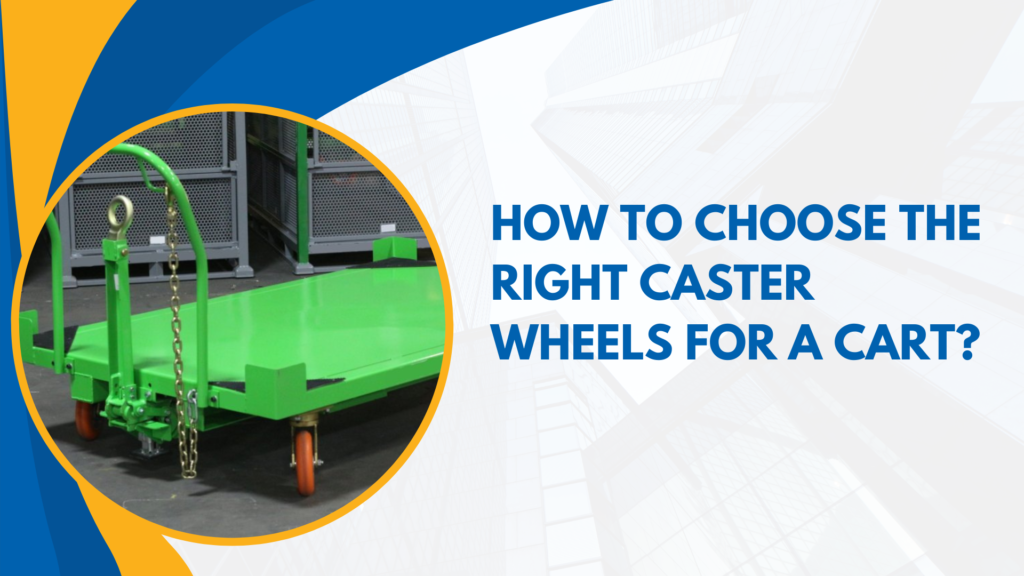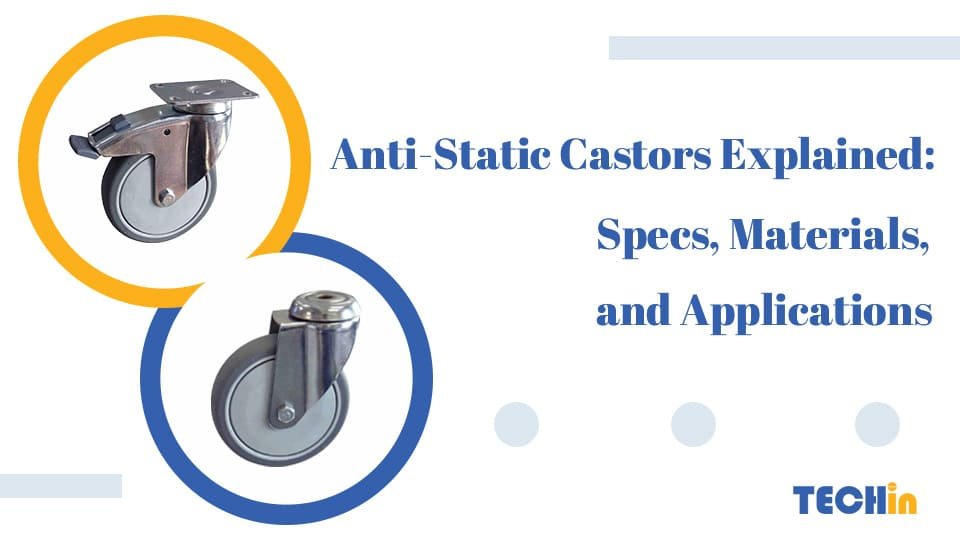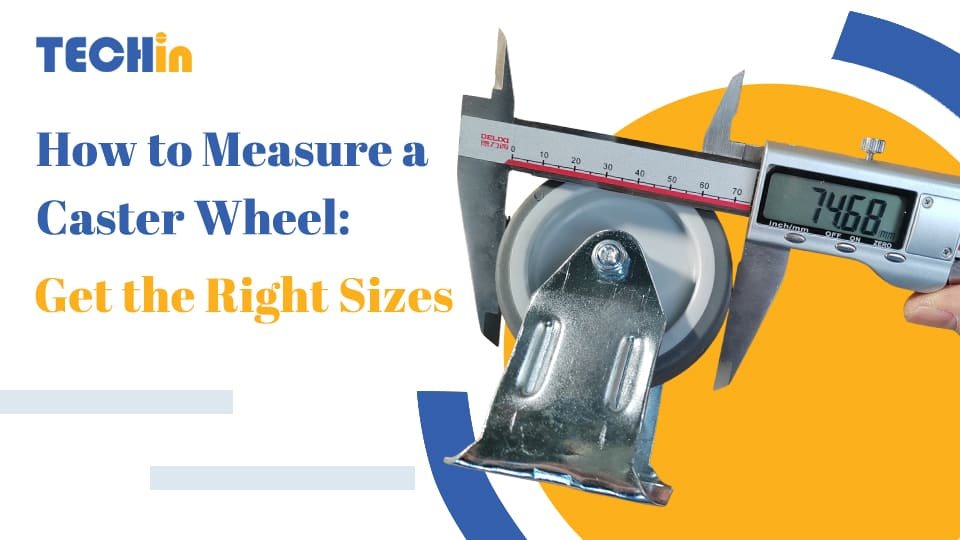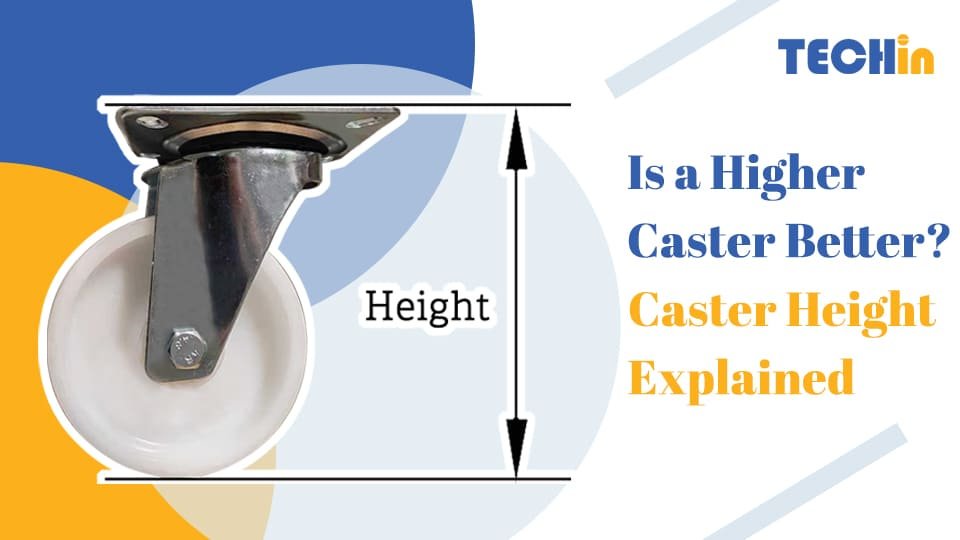Introduction
Choosing the right caster wheels for a cart can make a huge difference in how easy it is to move, how long it lasts, and how easy it is to use. Carts are used in all kinds of places—from warehouses and factories to healthcare facilities and outside—and each place has different needs. To pick the right caster wheels, you need to know about load capacity, wheel material, environmental factors, and handling requirements. This guide will tell you everything you need to know to make a good decision about caster wheels that will make your cart work great and last a long time.
Common Reasons for Caster Wheel Failure on Carts
Caster wheel failure can disrupt operations, result in costly repairs, and even damage floors or surfaces. Understanding common causes of wheel failure helps in choosing casters that reduce wear and maximize lifespan:
1. Mismatched Wheel Material for Cart Surface
Each surface requires a specific wheel material to ensure durability and smooth movement. For example:
- Smooth Indoor Surfaces: Harder wheels, like nylon or polyurethane, work best on surfaces such as tile, linoleum, and concrete. These materials are wear-resistant and provide smooth rolling but may be noisy on hard floors.
- Rough or Outdoor Surfaces: Softer materials, like rubber or pneumatic wheels, perform better on asphalt, gravel, or uneven ground. These wheels absorb shocks, reducing vibrations that damage wheels and strain workers.
- Hygienic or Sanitary Settings: Non-marking rubber or polyurethane wheels are crucial for carts in healthcare, food service, or cleanroom settings where floor protection and easy cleaning are essential.
2. Non-Swiveling Wheels in Maneuverable Cart Settings
Fixed casters provide stability but limit movement, which is a disadvantage in tight spaces. For carts that need high maneuverability, such as those used in crowded or narrow aisles, swivel casters are ideal as they allow 360° movement. Swivel casters also reduce wear on floors by minimizing friction during turns.
3. Overloading Caster Wheels
When a cart’s load exceeds caster capacity, wheels may deform, wear out quickly, or fail entirely. For carts with heavy loads, always choose casters with a load capacity that exceeds the heaviest expected load. Proper load calculations (see the “Load Calculation with Safety Factor” section) are essential to ensure that each caster supports its share of the weight.
4. Extended Stationary Loads
Carts left stationary under heavy loads risk tread deformation, especially with rubber or softer materials. This leads to flat spots on the wheels, making carts difficult to move. For carts that remain stationary under load for long periods, choose casters with high static load ratings to withstand the pressure without deforming.
Selecting casters based on these considerations reduces maintenance needs and prolongs wheel life, minimizing operational disruptions.
Key Criteria for Selecting Caster Wheels for a Cart
To ensure optimal performance, select caster wheels based on the cart’s specific usage, technical requirements, and environment.
1. Evaluate the Cart’s Surface Conditions
The operating surface plays a large role in caster selection. Different materials perform better depending on the surface type:
- Smooth Indoor Floors: Harder materials like nylon and polyurethane are durable and provide smooth, noise-free rolling on surfaces like concrete, tile, and linoleum.
- Outdoor or Rough Surfaces: Larger rubber or pneumatic wheels offer better shock absorption on uneven ground, reducing jarring impacts on carts.
- Sensitive or Clean Floors: For healthcare, food service, or lab settings, non-marking rubber or polyurethane wheels ensure that floors remain clean and undamaged.
2. Calculate Load Requirements for the Cart
To ensure carts operate safely under different conditions, calculating the load per caster with a safety factor is essential. This formula accounts for unexpected shifts or dynamic load changes that may strain individual wheels:
T = (E + Z) / (M × N)
Where:
- T: Required load capacity per caster
- E: Net weight of the cart itself
- Z: Maximum load weight (cargo)
- M: Number of casters on the cart
- N: Safety factor (typically 1.3 for uneven surfaces or 3.0 for dynamic/shock loads)
Example Calculation:
For a cart weighing 200 kg with a maximum 1000 kg load on four casters on an uneven surface:
- Total Load:
E + Z = 200 kg + 1000 kg = 1200 kg - Apply Number of Casters and Safety Factor:
T = 1200 / (4 × 1.3) ≈ 231 kg per caster
Each caster needs to support at least 231 kg to handle shifts in weight safely. This formula ensures a stable configuration, particularly useful for carts in dynamic or uneven environments.
3. Consider Maneuverability and Speed
The wheel’s size and type affect the cart’s ability to maneuver and handle different speeds:
- High-Speed Applications: For carts that move quickly or are machine-towed, large-diameter casters (100-150 mm+) support smoother rolling at high speeds.
- Frequent Maneuvering: Carts in tight spaces benefit from swivel casters that improve turning radius and reduce strain on users.
- High-Frequency Movement: Ball or roller bearings in casters are recommended for carts in constant use, as these bearings reduce friction, making the cart easier to push and pull.
4. Factor in Environmental Conditions
Certain environments require specific caster materials to withstand moisture, chemicals, or temperature fluctuations:
- Chemical Exposure: Polyurethane and nylon casters are resistant to many chemicals, making them suitable for carts used in labs or industrial settings.
- Moisture-Prone Areas: Stainless steel or zinc-coated casters resist corrosion in damp environments, ideal for food processing or outdoor use.
- High Temperatures: For heat-exposed areas, such as near ovens or industrial machinery, phenolic resin casters perform well at temperatures up to 300°C.
Selecting Compatible Wheel Material for Cart Usage
Choosing the right wheel material ensures long-lasting performance and reduces floor damage, noise, and wear. Here’s a breakdown of common caster wheel materials and their ideal applications:
| Material | Characteristics | Best Use Cases |
|---|---|---|
| Elastic Rubber | Shock-absorbing, quiet, provides good traction | Outdoor carts or rough surfaces (e.g., gravel, asphalt); absorbs vibrations well |
| Polyurethane | High load capacity, durable, non-marking, abrasion-resistant | Indoor or outdoor use on smooth to medium-rough surfaces; heavy-duty warehouse carts |
| Nylon (Polyamide) | Durable, chemical-resistant, low rolling resistance, easy to clean | Smooth surfaces; works well on linoleum, tile, and clean concrete; avoids slippage |
| Phenolic Resin | Withstands high temperatures, chemically resistant, heavy-duty load bearing | High-heat or chemical-prone areas, such as industrial settings or labs |
| Cast Iron | Extremely durable, handles heavy loads, noisy, may damage delicate floors | Heavy industrial carts on concrete, where durability is prioritized over floor safety |
Special Considerations for Cart Applications
Caster wheels need to match specific cart applications to ensure efficiency and safety. Here are additional considerations based on cart usage:
- High-Frequency Movement and Long Distances: For carts used frequently over long distances (e.g., in warehouses), ball or roller bearings reduce friction and improve ease of movement, minimizing operator fatigue and increasing efficiency.
- Push/Pull Resistance and Cart Size: Larger caster wheels reduce the force needed to push or pull a cart, making them ideal for heavier loads. Larger diameters also help navigate obstacles or inclines, crucial for warehouse or outdoor carts.
- Impact Loads on Carts: Carts frequently subject to heavy impacts or dropped loads benefit from shock-absorbing materials, like rubber or polyurethane, which help prevent wheel damage from sudden weight changes.
By selecting casters based on these criteria, you’ll ensure that the cart operates optimally under its specific conditions, reducing repair costs and improving operational safety.
Bearing Types and Maintenance for Cart Caster Wheels
Bearings affect the efficiency and durability of cart casters, especially in high-use applications. Selecting the right bearing type can minimize maintenance and improve performance:
- Plain Bearings: Best for light loads or occasional use. These are economical and require minimal upkeep but are unsuitable for heavy or frequently moved carts.
- Ball Bearings: Offer smooth rolling with minimal resistance, perfect for carts in constant use or moving long distances. They require regular lubrication for longevity.
- Roller Bearings: Ideal for heavy-duty applications, such as carts carrying high loads in industrial settings. While they support substantial weight, they require routine maintenance to prevent wear.
Regular maintenance (such as cleaning and lubricating) prolongs caster life and improves the ease of movement, ensuring carts perform consistently.
Caster Configurations for Optimal Cart Control
The caster configuration affects maneuverability, stability, and ease of handling. Selecting the right configuration is crucial based on the cart’s environment and movement needs:
- Two Fixed and Two Swivel Casters: A balanced setup that provides stable, straightforward movement, ideal for long aisles or narrow spaces where precision is key.
- Four Swivel Casters: Provides maximum maneuverability, allowing carts to pivot in tight areas or crowded workspaces. This setup is preferred in environments with frequent directional changes, such as hospitals or retail.
- Swivel Casters with Locks: Adds stability when needed, especially on inclined surfaces or during loading and unloading. Locking mechanisms help keep the cart stationary, preventing unintentional movement.
Choosing a configuration suited to the cart’s environment enhances handling and improves safety, especially for carts in tight spaces or areas with obstacles.
Environmental and Temperature Considerations for Carts
Environmental factors like temperature and moisture impact caster performance and lifespan. Selecting materials suited to these conditions ensures durability and reduces maintenance:
- High-Temperature Environments: Phenolic resin casters withstand high heat, making them suitable for carts near ovens or industrial heat sources.
- Cold Storage and Freezers: Rubber casters retain flexibility at low temperatures, preventing brittleness in cold settings. Harder materials like nylon may crack in freezing conditions.
- Chemical Exposure: Polyurethane and nylon resist many oils, solvents, and cleaning agents, making them ideal for industrial or laboratory environments where chemical contact is frequent.
- Moisture-Prone or Humid Environments: Stainless steel brackets and non-absorbent wheels resist corrosion, ensuring longevity in humid settings like food processing or outdoor areas.
Selecting casters that align with environmental requirements prevents unexpected wear and prolongs wheel lifespan, ensuring that carts are reliable and low-maintenance in specific settings.
Summary
Choosing the right caster wheels for a cart requires a careful balance of load capacity, surface compatibility, bearing type, and environmental suitability. When you match the features of the casters to the way you’re going to use the cart and the conditions you’re going to use it in, you’ll get more done, have less trouble, and make your cart last longer. Follow these guidelines to make sure you get the best cart setup for your work that will last a long time and do everything you need it to do.










